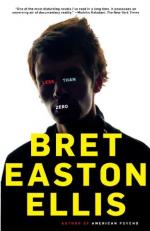|
This section contains 9,137 words (approx. 31 pages at 300 words per page) |

|
SOURCE: "'But This Road Doesn't Go Anywhere': The Existential Dilemma in Less Than Zero," in Critique, Vol. 33, No. 1, Fall, 1991, pp. 23-42.
In the following essay, Sahlin considers Ellis's Less Than Zero in the existential tradition of writers such as Franz Kafka, Albert Camus, Jean-Paul Sartre, Ernest Hemingway and F. Scott Fitzgerald.
In Less Than Zero (1985), Bret Easton Ellis joins the tradition of Hollywood writers who have been capitalizing on southern California, its landscape, and its lifestyle for more than fifty years. That group includes writers such as Nathanael West, James M. Cain, Raymond Chandler, and, more recently, Joan Didion and John Gregory Dunne. Hollywood has long served as a setting for fiction that reveals the corruption lurking behind glamorous lifestyles or, in the case of crime and detective novels, the intrigue and masquerade so suited to a city whose business is a form of deception. By the time...
|
This section contains 9,137 words (approx. 31 pages at 300 words per page) |

|


